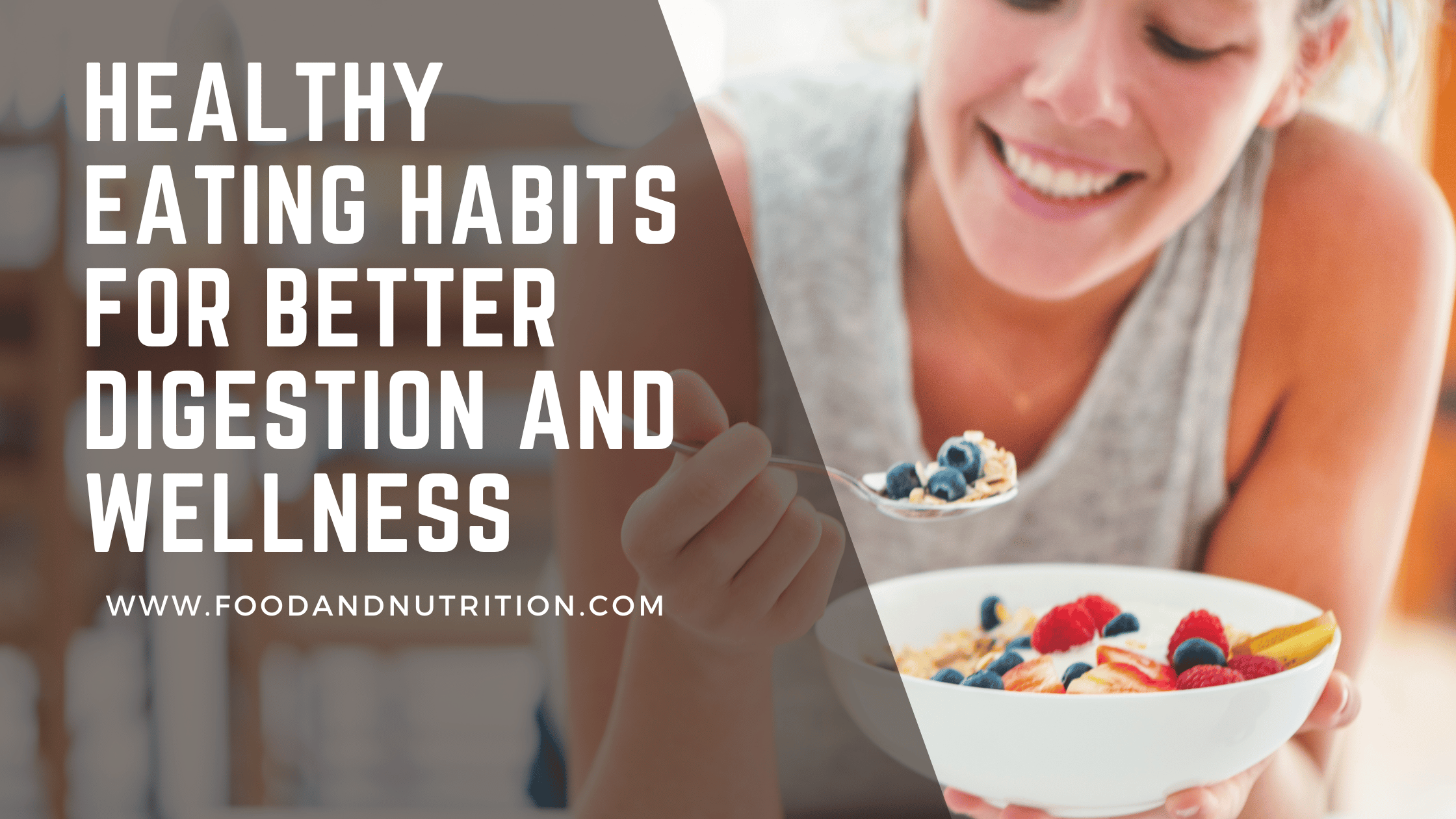Healthy Eating Habits for Better Digestion and Wellness

Nutrition is an essential aspect of our health and wellbeing, and it plays a critical role in our digestive health. Digestive health refers to the ability of our digestive system to break down food, absorb nutrients, and eliminate waste efficiently. A healthy digestive system is crucial for overall health and wellbeing, and it can be maintained through a balanced and nutritious diet. In this blog post, we will explore the importance of digestive health and provide tips on what foods and beverages to consider for optimal digestive health.
Importance of Digestive Health
The digestive system is responsible for breaking down food and absorbing nutrients that are essential for our body’s functions. A healthy digestive system ensures that we get the necessary nutrients from the food we eat, and it also eliminates waste efficiently. Digestive problems such as constipation, diarrhea, and bloating can lead to discomfort and even affect our quality of life. Therefore, it is crucial to maintain a healthy digestive system by consuming a balanced and nutritious diet.
Foods and Beverages for Digestive Health
- Fiber-Rich Foods
Fiber is a crucial nutrient for digestive health as it promotes regular bowel movements and prevents constipation. Foods such as fruits, vegetables, whole grains, legumes, and nuts are excellent sources of fiber. It is essential to consume both soluble and insoluble fibers, as they serve different functions in our digestive system. Soluble fiber dissolves in water and forms a gel-like substance, which helps to slow down digestion and regulate blood sugar levels. Insoluble fiber, on the other hand, adds bulk to the stool and promotes regular bowel movements.
- Probiotics
Probiotics are live bacteria and yeasts that are beneficial for our digestive system. They help to maintain the balance of good bacteria in our gut and prevent the growth of harmful bacteria. Foods such as yogurt, kefir, kimchi, sauerkraut, and kombucha are excellent sources of probiotics.
- Prebiotics
Prebiotics are non-digestible fibers that feed the good bacteria in our gut. They help to promote the growth of beneficial bacteria and improve digestion. Foods such as onions, garlic, leeks, asparagus, bananas, and oats are excellent sources of prebiotics.
- Water
Water is essential for maintaining a healthy digestive system. It helps to soften the stool, prevent constipation, and promote regular bowel movements. It is recommended to drink at least 8 glasses of water a day to maintain optimal digestive health.
Healthy Meal Ideas for Digestive Health
- Breakfast: Overnight Oats
Overnight oats are a delicious and nutritious breakfast option that is easy to prepare. Combine rolled oats, chia seeds, milk, and your favorite fruits in a jar and refrigerate overnight. In the morning, you will have a delicious and fiber-rich breakfast that will keep you full until lunchtime.
- Lunch: Quinoa Salad
Quinoa is a nutrient-dense grain that is rich in fiber and protein. Combine cooked quinoa with chopped vegetables such as cucumber, tomato, and bell peppers. Add some chickpeas or grilled chicken for additional protein. Drizzle with olive oil and lemon juice for a flavorful and healthy lunch.
- Dinner: Grilled Salmon with Roasted Vegetables
Salmon is an excellent source of omega-3 fatty acids, which are beneficial for heart and brain health. Grill a salmon fillet and serve with roasted vegetables such as sweet potatoes, broccoli, and carrots. Drizzle with olive oil and sprinkle with herbs for a delicious and nutritious dinner.
Having a Positive Image of Eating
In addition to consuming nutritious foods and beverages, it is essential to have a positive image of eating. Eating should not be viewed as a chore or a punishment, but rather as an enjoyable and fulfilling experience.
It is essential to savor the flavors and textures of the food we eat and appreciate the nourishment it provides for our bodies. Eating in an orderly fashion can also promote healthy digestion. It is recommended to eat slowly and chew our food thoroughly to aid in digestion and prevent overeating. Eating in a calm and relaxed environment can also promote healthy digestion and reduce stress, which can negatively impact digestive health.
Furthermore, it is important to listen to our bodies and honor our hunger and fullness cues. Restrictive diets and restrictive eating patterns can lead to disordered eating habits and negatively impact our digestive health. Instead, we should focus on consuming a balanced and varied diet that includes a variety of nutrient-dense foods.
In conclusion, digestive health is crucial for overall health and wellbeing, and it can be maintained through a balanced and nutritious diet. Consuming fiber-rich foods, probiotics, prebiotics, and water can promote healthy digestion and prevent digestive problems. Incorporating healthy meal ideas into our daily routine can also ensure that we consume a varied and nutritious diet. Finally, having a positive image of eating can promote healthy digestion and prevent disordered eating habits. By prioritizing our digestive health, we can improve our overall health and wellbeing and live our lives to the fullest.
- Nourishing Little Explorers: The Nordic Diet for Kids
- Eating Your Way to Healthy Blood Pressure: A Guide to Lowering Hypertension
- Unlock the Flavor: The Ultimate Guide to Cooking Salts
- Hydration Mastery for Athletes: Track & Field Performance Boost
- Salt & Heart Health: Unveiling the Truth Behind Sodium Intake
- Boost Immunity with Nordic Diet: A Guide for Healthier Living